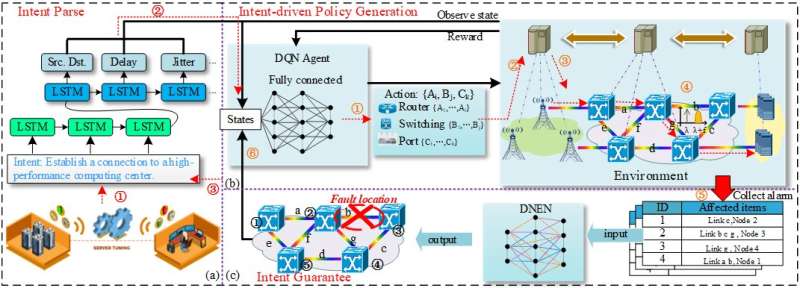Architecture of intent defined optical network. Credit: Science China Press
The automatic operation and maintenance of optical network is important for ensuring information communication and network operation. The growing variety of services has forced operation and maintenance personnel to face tremendous operational pressure. A recent study has constructed a control architecture called intent defined optical networks (IDON) to cope with the issue.
The research related paper "Intent Defined Optical Network with Artificial Intelligence-based Automated Operation and Maintenance" is recently published in a special focus on artificial intelligence for optical communications in Science China Information Sciences. The paper is lead by Hui Yang as the corresponding author and associate professor of Beijing University of Posts and Telecommunications. Researchers have adopted a self-adapted generation and optimization policy (SAGO) to perform control research on intent defined optical network architectures, revealing two key closed-loop operations, namely closed-loop strategies generation and closed-loop intent guarantee.
Traditionally, the operation and maintenance of optical networks rely on the experience of engineers to configure network parameters, including command line interfaces, middleware scripts, and troubleshooting. With the rapid development of Internet of Things and high bitrate applications beyond 5G and 6G, a large number of applications are presented on the network in the form of intentions, such as the Internet of Vehicles which closely interact with the environment. As an important support of the policy of "network power," the optical network faces the challenges of accurate match of the intent application and the complex control of highly dynamic applications, resulting in unsatisfactory levels of manual operation and maintenance. In such cases, operators urgently need to consider the upgrade of their optical network architecture to achieve automatic intelligent operation and maintenance.
Research on intent defined optical networks (IDON) introduces an adaptive generation and optimization (SAGO) strategy in a self-optimizing way. The IDON architecture can achieve intent-oriented configuration conversion, realize adaptive generation and optimization strategies, and perform closed-loop intent-guaranteed operations. IDON specifically addresses communication intent and uses natural language processing to construct semantic graphs to understand, interact, and operate the required network configuration. Then, deep reinforcement learning (DRL) is utilized to dynamically integrate fine-grained strategies to find a synthesis strategy which meets the requirements of the intent. Finally, a deep neural evolution network (DNEN) was introduced to respond to failures to achieve intent guarantee at the millisecond level. The researchers have validated feasibility and efficiency on an enhanced SDN test platform.
These results have enriched the research on intelligent operation and automation of optical networks based on artificial intelligence. IDON with SAGO is not only of great significance to the research of operation automation of optical networks, but also has very important scientific significance and reference value for the application of zero-touch operation and artificial intelligence in networks.
"To the best of our knowledge," the researchers wrote, "We have investigated and presented the functional entities of the architecture and interworking procedure in optical network automatic operation. The performances are demonstrated on the testbed for intent-based control. Our experiments verify that IDON with SAGO can effectively perform intent translation and zero-touch configuration."
More information: Hui Yang et al, Intent defined optical network with artificial intelligence-based automated operation and maintenance, Science China Information Sciences (2020). DOI: 10.1007/s11432-020-2838-6
Provided by Science China Press
























